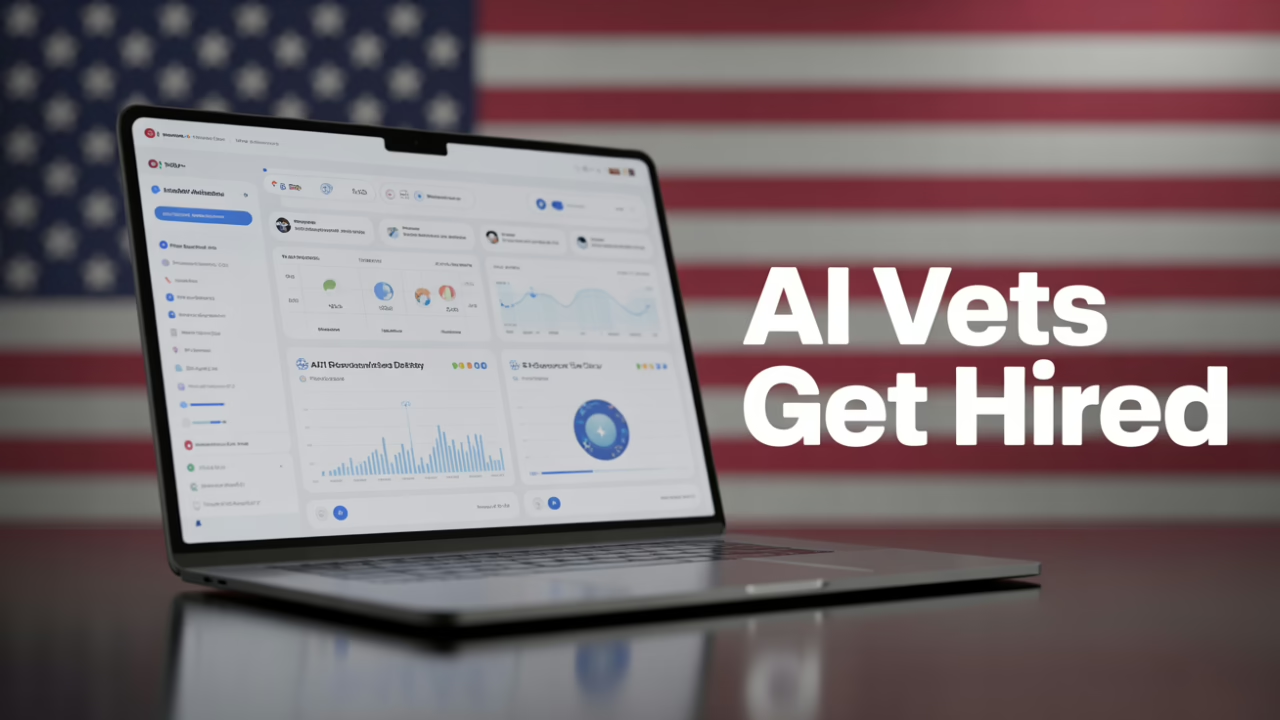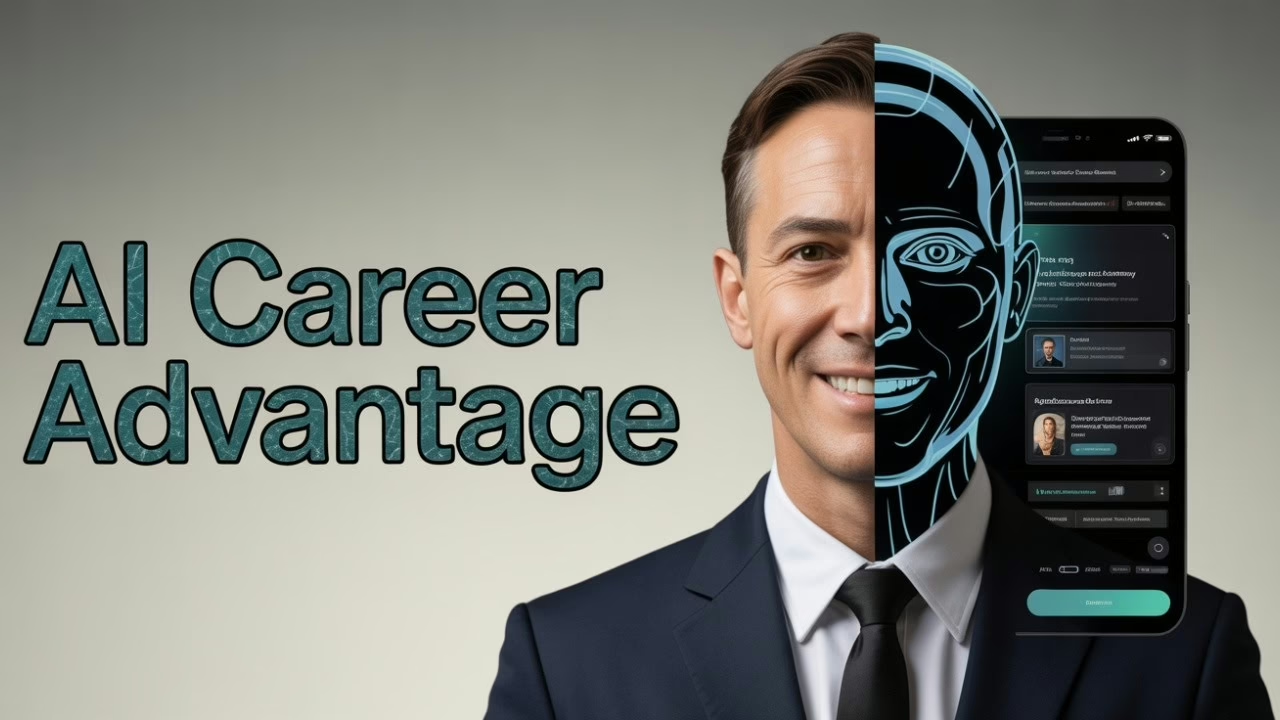It started at a backyard barbecue—a friend showed me, a stubbornly non-techy veteran, how her resume landed her three marketing interviews in a week. The secret? AI tools I’d always shrugged off. (Full disclosure: I thought AI was mostly for sci-fi nerds and Google ads.) Turns out, this ‘invisible helper’ is making waves for veterans like me, opening doors to jobs and translating military hustle into in-demand civilian skills. If you’ve ever fumbled for the right words on a resume or felt like an imposter in job interviews, this post is for you.
Confessions From the Job Search Trenches: Why Veterans Feel Like Outsiders
Let me paint you a picture that might sound familiar. You walk into an interview room, confident about your years of leadership experience. The hiring manager asks about your background, and you mention leading a platoon through complex operations. Their eyes glaze over. Suddenly, you’re speaking a foreign language in your own country.
Veteran job seekers face this reality daily. It’s not that our skills aren’t valuable—it’s that we’re terrible at translating them into corporate speak. How do you explain that managing logistics for a forward operating base is basically supply chain management on steroids? Or that coordinating multi-unit operations is project management under life-or-death pressure?
The Skills Translation Nightmare
Research shows that military experience often gets lost in translation during job applications. We say “platoon leader,” they hear… well, nothing that makes sense for their marketing department. The skills gap isn’t real—it’s a communication problem.
I remember one veteran telling me:
“The biggest hurdle for me was explaining my deployment leadership—not everyone gets military lingo.”
This hits hard because it’s so common. We’re fluent in one professional language but need to become bilingual overnight.
The Invisible Veteran Problem
The job market challenges go deeper than just language barriers. Sometimes it feels like we’re invisible in a crowded room of candidates. Employers see “Army” on a resume and make assumptions—either we’re too rigid or we’re damaged goods. Neither stereotype helps.
Competition is fierce out there. Everyone’s fighting for the same positions, and veteran job seekers often feel like we’re bringing a military manual to a corporate strategy meeting. The rules seem different, the players speak differently, and sometimes it feels like we’re outsiders looking in.
What Really Happens in Interview Rooms
Here’s the truth nobody talks about: that moment when you realize your “leadership experience” means nothing to the person across the table. You’ve managed million-dollar equipment, made split-second decisions that saved lives, and coordinated complex operations. But somehow, explaining why that makes you perfect for managing their sales team becomes impossible.
The good news? AI tools help translate military skills to civilian job requirements, making this transition smoother. These platforms can take your military role and show you exactly how to present it in business terms. They’re like having a translator who speaks both military and corporate fluently.
Why Employers Miss Out
Veterans bring dedication, leadership, and teamwork skills that are gold in any workplace. But when resume optimization doesn’t happen properly, employers never see past the military jargon to recognize the talent sitting right in front of them.
The skills gap myth persists because we’re not speaking the same language. But with AI-driven strategies for tailored job applications and interview preparation, that’s starting to change. Finally, there’s hope for bridging this communication divide.

AI: The Veteran’s Secret Weapon (And Why You Don’t Need to Be a Tech Genius)
Let me bust a massive myth right off the bat: AI isn’t just for coders and data geeks. I get it—when you hear “artificial intelligence,” your brain probably jumps to some sci-fi movie or that one tech buddy who speaks in programming languages. But here’s the real talk: AI is more accessible than ever, and it’s basically designed for people like us who want results without a computer science degree.
Think of AI as your new partner—one that can help you shine brightly and showcase all your unique skills. Research shows that AI-driven tools can enhance veteran employment by up to 30% by improving job matching processes. That’s not some distant future; that’s happening right now on AI-powered platforms across the web.
Practical AI That Actually Matters
Here’s where it gets interesting. AI can write your emails (and make them sound professional), spot job matches that align perfectly with your military experience, and pinpoint audiences for marketing gigs you might be considering. AI algorithms are working behind the scenes on platforms that translate your military skills into civilian job requirements seamlessly.
I’ve seen veterans land logistics roles, project management positions, and marketing jobs through these smart systems. The artificial intelligence workforce tools analyze what you’ve done, match it with what employers need, and present it in a way that makes perfect sense to hiring managers.
Your Digital Battle Buddy
Here’s a wild card thought: if AI were your best military buddy during transitions, it would have had your back in ways you never imagined. It would’ve spotted opportunities you missed, translated your accomplishments into civilian speak, and maybe even practiced interview questions with you at 0300 when you couldn’t sleep.
Turns out, AI is less R2-D2 and more like that sharp-tongued sergeant who always got the job done—just in the digital world.
The beauty of modern AI workforce resources is that they’re built for real people. Many are user-friendly and designed for folks without deep tech backgrounds. You already have incredible discipline and problem-solving skills—AI tools just boost what you’ve already got.
Personalized Career Guidance That Gets It
Today’s AI-powered platforms deliver personalized career guidance, skills development, and interview prep that actually understands your background. These systems don’t just throw random job listings at you—they learn your preferences, analyze your experience, and serve up opportunities that make sense.
The platforms offer everything from resume optimization to tailored job applications. Some even provide personalized recommendations for training programs and certifications based on your profile and career goals. It’s like having a career counselor who never sleeps and has access to thousands of job opportunities.
Learning AI basics is more accessible than you think. Online courses teach the fundamentals, many free or affordable. You can start small, build knowledge at your own pace, and focus on what interests you most. Every step forward counts, and the skills you gain—data analysis, understanding customer needs, effective communication—translate directly into career advancement.
From ‘Lost in Translation’ to Winning: Major Tom’s Oddly Relatable AI Journey
Let me tell you about Major Tom—not his real name, but his story is 100% authentic. After 15 years of military service, this guy was basically wandering in career wilderness. Sound familiar? He had leadership skills that could move mountains, but somehow his resume felt like it spoke a foreign language to civilian employers.
Major Tom stumbled across AI and marketing through pure curiosity. Honestly, his first reaction was probably like yours: “This tech stuff is way too complicated for someone like me.” But here’s where veteran success stories always get interesting—stubborn determination kicks in.
The Messy Beginning That Actually Worked
Tom started with free online workshops. Picture this: a decorated military leader fumbling through AI-powered content tools, trying to figure out how algorithms analyze market trends. The first few attempts? Complete disasters. But something clicked when he discovered social media scheduling.
It wasn’t glamorous. Just learning how AI could schedule posts and track engagement. But for the first time since leaving service, Tom felt like he was speaking the same language as the civilian job market. AI solutions for veterans don’t always look like rocket science—sometimes they’re as simple as understanding when your LinkedIn post gets the most views.
The One Win That Changed Everything
Research shows that veterans are finding job opportunities through AI-powered platforms at unprecedented rates, and Tom became part of that trend. His breakthrough moment came from one perfectly timed social media post. As he puts it:
“All it took was one scheduled social post and suddenly the next week, I was in two interviews—thanks, AI.”
That single victory shifted everything. Suddenly, AI-driven strategies weren’t intimidating—they were tools that made sense. Tom realized he didn’t need to become a tech wizard overnight. He just needed to understand how AI could translate his military experience into civilian opportunities.
Why This Story Matters for Every Veteran
Tom’s journey reflects what’s happening across the veteran community right now. Career growth is accelerating for veterans who embrace AI tools—not because they’re becoming programmers, but because they’re learning to leverage technology that speaks their language.
The pattern is clear: start small, build confidence, then watch doors open. Tom used basic AI scheduling and trend analysis to land marketing interviews. John (another vet I know) used AI-powered job matching to secure a logistics position that perfectly matched his military background.
These aren’t isolated incidents. Veteran success stories are multiplying, and AI keeps showing up as the common thread. The beauty isn’t in the complexity—it’s in how accessible these tools have become for people ready to take that first awkward step forward.
Tom went from feeling lost in translation to speaking fluent “civilian career.” The secret wasn’t mastering AI—it was letting AI help him master the job market.

The Unscripted Road Ahead: Embracing Imperfect Progress
Here’s the breaking news nobody wants to admit: there’s no perfect way to use AI technology. You’re going to start awkward, learn loud, and somehow get somewhere better. And honestly? That’s exactly how it should be.
I’ve watched too many veterans get stuck in analysis paralysis, waiting for the “right” moment to dive into AI workforce resources. Meanwhile, thousands of veterans are already accessing upskilling opportunities through the VA and other organizations each year, figuring it out as they go. They’re not waiting for permission or perfection—they’re just starting.
Your action steps don’t need to be groundbreaking. Try an AI tool that catches your eye. Sign up for a webinar about career trajectory shifts. Read one success story about someone who made it work. Progress is messy, but it’s doable. Research shows that AI-powered platforms can offer personalized recommendations for training programs and certifications based on your unique background—but only if you actually engage with them.
The truth about learning and development? It’s not linear. Never has been, never will be. You already know this from your military experience. Veterans are naturally adaptable, which puts you ahead of the game when AI technology throws its next curveball. Because it will. This field isn’t static, and the job market keeps shifting in ways nobody can predict.
“Remember, everything is figure outable. If you’re stubborn enough to survive bootcamp, you can tackle AI.”
Career growth using AI hinges on bite-sized upskilling and a willingness to take imperfect action. Not perfect action. Imperfect action. The kind where you show up, try something new, maybe fail a little, then adjust and keep going. The real win isn’t mastering everything immediately—it’s showing up and trying when pursuing AI career tools feels uncomfortable.
Here’s my wild card challenge for you: imagine yourself thriving in a marketing job a year from now. Picture yourself surprising literally everyone—maybe even yourself. You’re using AI tools you’ve never heard of today, solving problems in ways that seemed impossible right now. The VA and other organizations are already building bridges to make this transition smoother, with AI workforce resources designed specifically for veterans like you.
Your time is now. The world of AI marketing is calling, and it’s an invitation to a brighter future filled with growth and opportunities you can’t even see yet. You have the strength, skills, and drive. You’ve overcome bigger challenges than learning new technology.
Start today with one small step. Explore that AI tool. Read that article. Sign up for something. The key is just getting started, because steady progress pays off. You’ve got this—and the future you’re building is going to be worth every awkward beginning.
TL;DR: AI may sound flashy, but it’s your new secret weapon for turning military strengths into real jobs—no tech wizardry required. Start small; the future’s got your back.

